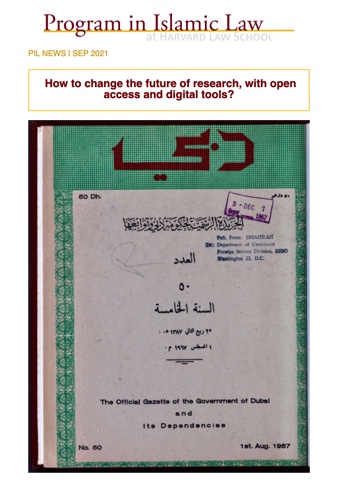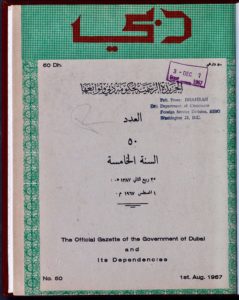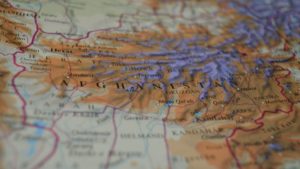
 How to change the future of research, with open access and digital tools?: We are excited to share that the Program in Islamic Law has initiated an unprecedented, multifaceted collaborative effort with the Library of Congress to add open access texts with data science tools on sources for Islamic law, historically and in the modern world. The collaboration has two parts – identifying and displaying sources free from copyright, and creating search tools that allow researchers to find them and other texts. Librarians and researchers—including faculty, fellows, and students—will team up to identify, select and assess the copyright status of materials focusing on national legal gazettes in the larger Muslim world. These legal gazettes play a vital role in legal practice and in scholarship because they are the primary sources for law in foreign jurisdictions and are often the only place where a law is published in that jurisdiction. They are the equivalent of the U.S. reporters and codes, containing American judicial and legal decisions. This joint effort, headed by PIL Faculty Director Professor Intisar Rabb and newly appointed Law Librarian of Congress Aslihan Bulut, will greatly expand public access to the Library of Congress’ gazette collections, which have been acquired since the mid-19th century for about 300 national and subnational jurisdictions.
How to change the future of research, with open access and digital tools?: We are excited to share that the Program in Islamic Law has initiated an unprecedented, multifaceted collaborative effort with the Library of Congress to add open access texts with data science tools on sources for Islamic law, historically and in the modern world. The collaboration has two parts – identifying and displaying sources free from copyright, and creating search tools that allow researchers to find them and other texts. Librarians and researchers—including faculty, fellows, and students—will team up to identify, select and assess the copyright status of materials focusing on national legal gazettes in the larger Muslim world. These legal gazettes play a vital role in legal practice and in scholarship because they are the primary sources for law in foreign jurisdictions and are often the only place where a law is published in that jurisdiction. They are the equivalent of the U.S. reporters and codes, containing American judicial and legal decisions. This joint effort, headed by PIL Faculty Director Professor Intisar Rabb and newly appointed Law Librarian of Congress Aslihan Bulut, will greatly expand public access to the Library of Congress’ gazette collections, which have been acquired since the mid-19th century for about 300 national and subnational jurisdictions.
 CONTENT: Islamic Constitutionalism One aim of SHARIAsource is to provide access to primary and secondary sources of Islamic law to support research on salient issues of Islamic law and history. Our latest feature on the portal is the new Islamic Constitutionalism Special Collection, edited by Dawood Ahmed, Moamen Gouda, and Tom Ginsburg. This collection provides a survey instrument codifying the thirty “Islamic clauses,” which are those constitutional clauses that make a reference to Islam or having an Islamic underpinning, modeled after The 1978 Al-Azhar Constitution. The Islamic Constitutions Index (ICI) measures the degree of Islamicity of the Constitutions within the Muslim majority countries. This collection contains nearly 500 constitutions from across the world and from different time periods. Check out this special collection today!
CONTENT: Islamic Constitutionalism One aim of SHARIAsource is to provide access to primary and secondary sources of Islamic law to support research on salient issues of Islamic law and history. Our latest feature on the portal is the new Islamic Constitutionalism Special Collection, edited by Dawood Ahmed, Moamen Gouda, and Tom Ginsburg. This collection provides a survey instrument codifying the thirty “Islamic clauses,” which are those constitutional clauses that make a reference to Islam or having an Islamic underpinning, modeled after The 1978 Al-Azhar Constitution. The Islamic Constitutions Index (ICI) measures the degree of Islamicity of the Constitutions within the Muslim majority countries. This collection contains nearly 500 constitutions from across the world and from different time periods. Check out this special collection today!
 CONTEXT: Afghanistan, the Taliban, and Islamic Law We recently curated a Resource Roundup on Afghanistan, the Taliban, and Islamic Law on our Islamic Law Blog. These resources collectively point to diverse approaches within a 1400-year-old legal tradition, spanning the globe, comprised of multiple approaches to law that are equally authoritative and all trying to determine how best to order society. The sources represent extensive yet digestible research grouped around five, thematic questions: (1) the definition of sharī’a, or Islamic law, generally (2) the existing and possible applications of Islamic law in Afghanistan under the new regime (3) the status of Islamic law vis-a-vis the state in Afghanistan and by comparison in surrounding countries in South Asia (4) perspectives and positions on women and gender in Islamic law, with a focus on the region (5) criminal law and the laws of war under Islamic law. Explore the roundup today!
CONTEXT: Afghanistan, the Taliban, and Islamic Law We recently curated a Resource Roundup on Afghanistan, the Taliban, and Islamic Law on our Islamic Law Blog. These resources collectively point to diverse approaches within a 1400-year-old legal tradition, spanning the globe, comprised of multiple approaches to law that are equally authoritative and all trying to determine how best to order society. The sources represent extensive yet digestible research grouped around five, thematic questions: (1) the definition of sharī’a, or Islamic law, generally (2) the existing and possible applications of Islamic law in Afghanistan under the new regime (3) the status of Islamic law vis-a-vis the state in Afghanistan and by comparison in surrounding countries in South Asia (4) perspectives and positions on women and gender in Islamic law, with a focus on the region (5) criminal law and the laws of war under Islamic law. Explore the roundup today!
See the full newsletter.

